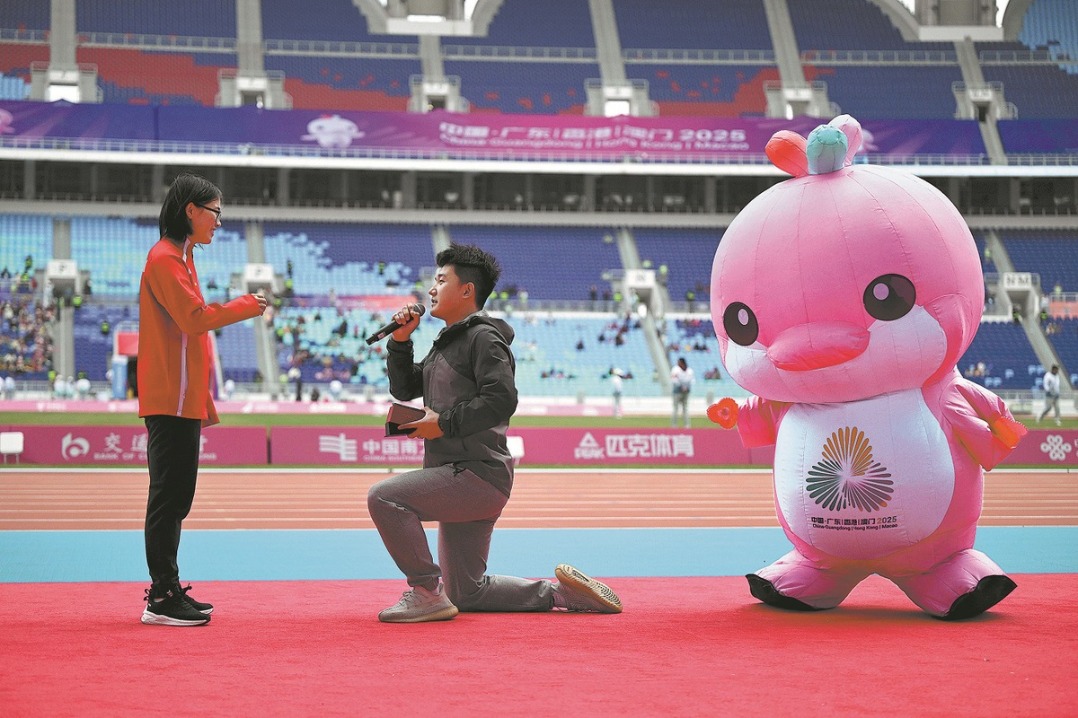For love of country

Educator translates affinity for Kenya into passion for teaching Chinese culture and language
Wu Shengzheng is no ordinary Chinese businessman or contractor in Nairobi. He is a man on a mission to educate as many willing Kenyans as possible about Chinese culture, philosophy and language.
Wu, the director of the Confucius Institute at Kenyatta University in Nairobi, became one of two directors at the institute after he was appointed to the post in December 2013. In China, he was a professor of traditional Chinese philosophy at Shandong University.
| Wu Shengzheng in his office at the Kenyatta University Confucius Institute. He first came to Kenya in 2010. Philip Etyang / For China Daily |
The 47-year-old says he first came to Kenya in January 2010 as a lecturer for Kenyatta University's Confucius Institute, established in December 2008 through the collaboration between Kenyatta University, Shandong Normal University and the Office of Chinese Language Council International (colloquially known as Hanban).
"I love Kenya, that is why immediately after getting married in 2013, I opted to come and teach about Chinese culture at the Confucius Institute at Kenyatta University," he says.
The two things that endear him the most to Kenya is the fact that Kenyans have no bias against Chinese people and that China and Kenya have a lot of historical similarities, he says.
"Kenya also has a very beautiful environment that has been well protected. I have visited the world-famous Maasai Mara in Narok County. Every day I urge my colleagues not to destroy the environment," he says.
He also says that he persistently reminds his Chinese colleagues that ivory trading is illegal.
The Maasai Mara National Reserve is a large game park in Kenya known for its great population of lions, cheetahs and rhinos. It is adjacent to the Serengeti National Park in Mara, Tanzania. Maasai Mara has gained a lot of worldwide attention in recent years because of the Great Wildebeest Migration seen by many as the "eighth world wonder".
Wu says his wife, who lives with him on the Kenyatta University main campus located along the Thika Super Highway, has been supportive of his work at the institute.
"She has on several occasions done purely voluntary work at the institute," Wu says.

In recent years, the institute has seen an upward trend in enrollment, part of which is credited to the university's policy of offering the institute's Chinese courses at subsidized fees to Kenyatta University students and staff. School staff members and students are charged 2,000 Kenyan shillings ($22) for each course while non-university students are charged between Sh20,000 and Sh40,000 depending on the program.
"The fees paid by students taking courses at the institute are kept by the university and not the Confucius Institute. In fact, I wish we could offer the courses for free," he says.
The institute has a teaching faculty of 20 and 9 non-teaching staff members. Of the teachers, 10 are Chinese and the rest are Kenyans. Wu says this parity gives an edge to the students from Kenyatta University compared with the students at the Confucius Institute at the University of Nairobi.
The University of Nairobi Confucius Institute is the oldest institute of its kind in Africa, established on Dec 19, 2005, after Tianjin Normal University formed a partnership with the University of Nairobi.
There are currently three Confucius Institutes in Kenya, with the third one located at Egerton University. There is also a Confucius Classroom at China Radio International's office building in Nairobi.
On Sept 27, the institute held celebrations to mark the 10th anniversary since the founding of the Confucius Institute. Wu says the future of Confucius Institutes in Africa is looking bright because more Africans than before are seeking training in Chinese language and culture. He associates the upward trend to the growth in trade and cultural exchanges between the two sides.
China is Africa's biggest trade partner, overtaking the United States in 2012. China is Kenya's second-largest trade partner, with figures reaching their highest level in 2013.
For China Daily
(China Daily Africa Weekly 01/16/2015 page28)
Today's Top News
- UN envoy calls on Japan to retract Taiwan comments
- Innovation to give edge in frontier sectors
- Sanctions on Japan's former senior official announced
- Xi stresses importance of raising minors' moral standards
- Coordinated reform key to country's growth
- Shandong gives new life to traditions































